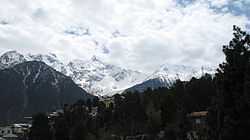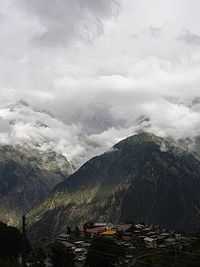Kalpa, Himachal Pradesh
| Kalpa | |
|---|---|
| city | |
 | |
 Kalpa | |
| Coordinates: 31°32′N 78°15′E / 31.53°N 78.25°ECoordinates: 31°32′N 78°15′E / 31.53°N 78.25°E | |
| Country |
|
| State | Himachal Pradesh |
| District | Kinnaur |
| Elevation | 2,960 m (9,710 ft) |
| Population | |
| • Total | 84,298 |
| Languages | |
| • Official | Hindi |
| Time zone | IST (UTC+5:30) |
| PIN | 172108 |
Kalpa is a small town in the Sutlej river valley, above Recong Peo in the Kinnaur district of Himachal Pradesh, Northern India, in the Indian Himalaya. Inhabited by Kinnauri people and famous for its apple orchards. Apples are a major cash-crop for the region. The local inhabitants follow a syncretism of Hinduism and Buddhism, and many temples in Kalpa are dedicated to both Hindu and Buddhist gods and goddesses. The average literacy rate of Kalpa is around 83.75%.One of the famous music director of Himachal Pradesh,Surender Negi, is from Kalpa.
Geography
Kalpa is at 31°32′N 78°15′E / 31.53°N 78.25°E.[1] It has an average elevation of 2,960 metres (9,711 feet). It is located 265 kilometres (165 mi) beyond Shimla on the NH-22 in Kinnaur district. It is located at the base of the Kinnaur Kailash snow-capped ranges. The Shivling peaks rise up to 20,000 feet (6,000 m). Kalpa is among apple orchards, pine-nut forests and the stately deodhars. It is above the town of Reckong Peo, the district headquarters of Kinnaur, which has a hundred-year-old Buddhist monastery.

Overview


Kalpa is a town with a history of ancient temples. The Sutlej River below hurtles through deep gorges, the winding mountain road is bordered by chilgoza forests. The serenity of this sleepy hamlet was not often visited by foreigners until recently, but there are still relatively few visitors. There are now over 5 places to stay in Kalpa and more, below, in Reckong Peo where travelers must stop to get their inner line permits to continue upwards to the Spiti Valley, which is a small ancient part of what used to be Tibet. The view from Kalpa is beautiful with an observer getting the feeling that he is sitting in the lap of the mountains with the entire range of peaks being visible. Also visible from this place is the sacred Shivling rock on the Kailash mountain that changes its color at different points in the day.
In Episode 5 of Ice Road Truckers#IRT: Deadliest Roads - Season 1: Himalayas Lisa Kelly and Rick Yemm delivered two images (one each) (well packed with sandbags and sand and straw) of the goddess Kali (shown as treading on her husband Shiva) along a frightful mountain road hacked out of cliffsides to a temple at Kalpa.
Demography
Kalpa is one of the biggest and beautiful village of Kinnaur district. Kalpa has an average literacy rate of 83.75%. It is very famous for production of high quality of apples, and pinus gerardiana also known as chilghoza. All the area in tehsil Kalpa is apple growing area, which is the main cash crops of those people who live here. Kalpa is a famous tourist place in the world, a beautiful view of Kinnaur Kailash (locally known as kinner kailsh) attracts tourists here, there are spectacular sights early in the morning as the rising sun touches the snowy peak with crimson and golden light. Kalpa is surrounded by Deodar, apple, and pinus gerardiana chilghoza trees. In winter all the villages are covered by about 5–7 feet of snow, and the temperature can drop to as low as -20°C, heavy woolens are required even most of time in summer.
Places of Interest
Reckong Peo : Located 260 km from Shimla, 7 km from Powari and 8 km from Kalpa. Reckong Peo is the headquarter of district Kinnaur.
Kothi : Just 3 km from Recong Peo. Kothi has a temple dedicated to the goddess Chanadika Devi. Set against a backdrop of mountains and groves of the deodar the temple has an unusual architectural style and fine sculpture. An exquisite gold image of goddess is enshrined in sanctum.
Climate
All the area of Kalpa enjoys a temperate climate due to its high elevation, with long winters from October to May, and short summers from June to September. During winter time heavy woolens are required when temperature goes below freezing point around -15 degree to - 20 degree.
Food habits
The staple food is wheat, ogla, phafra and barley which are local produce. Besides these kankani, cheena, maize, chollair and bathu are also taken. The principal pulses consumed are peas, black peas, mash and rajmash. The vegetables usually consumed are cabbage, turnips, peas, beans, pumpkin, potato, okra and tomato besides some locally available wild green vegetables leaves. They relish rice too which is imported from the plains. Taking a salted tea called cha in the morning and evening is very popular among the Kannauras which is usually taken along with sattu made of parched barley flour. People are non-vegetarian, which means tamasic or in the mode of ignorance, and they relish goat and ram's meat. Taking of alcoholic drinks in their day to day life and also on the ceremonial or festive occasions is quite common among them. Alcohol is distilled at the household level. It is made out of fruits like grapes, apple, pear etc. grown locally and of barley.
Lifestyle
Generally, Kinner houses have storerooms for keeping grain and dried fruits, and separate wooden grain-storage structures, called kathar. Pakpa, a piece of sheepskin or yakskin, is often placed on the khayarcha mat. Traditionally Kinners use utensils made of brass and bronze. Modern influences have included the introduction of Chinese crockery, and utensils made of stainless steel and aluminium. Clothes are mainly of wool. The thepang, a grey woollen cap, is worn with a white velvet band. The Tibetan chhuba, a long woollen coat which resembles an achkan, is worn as well, with a sleeveless woollen jacket. While men wear woollen churidhar pajamas, and tailored woollen shirts such as the chamn kurti, the women wrap themselves up in a dohru. The first wrap of the dohru is based on the back, with embroidered borders displayed throughout its length, which stretches to the heels. Darker shades of colours are preferred for the Dohru, although other beautifully coloured shawls may be worn, usually draped over the shoulders. A choli, another type of full sleeved blouse worn by women, may serve as a decorative lining as well. The Kinners are classified mainly into two castes: lower and upper caste. Again both of these categories are divided into sub classes. The caste system is more prevalent in the Lower and Middle Kinnaur regions
Religion
Hinduism is the main religions in the district followed by Tibetan Buddhism. These two religions have undergone religious mixing, along with some indigenous shamanistic practices.
References
External links


| Wikimedia Commons has media related to Kalpa. |